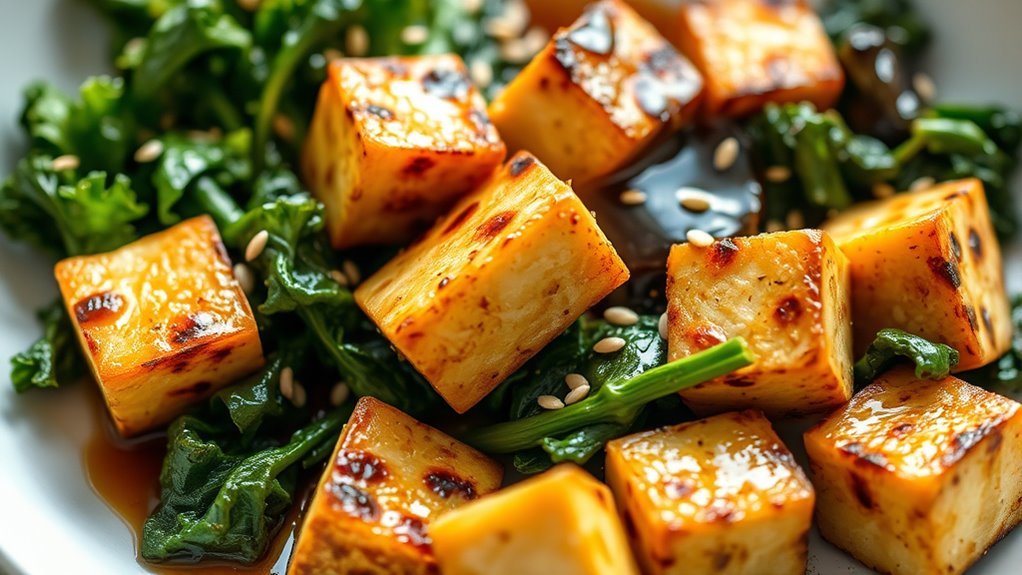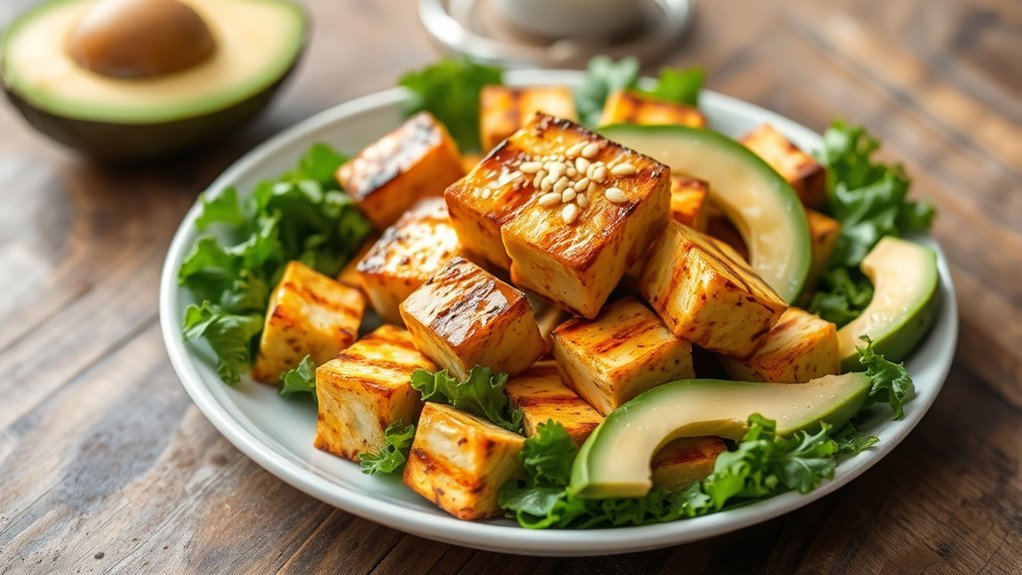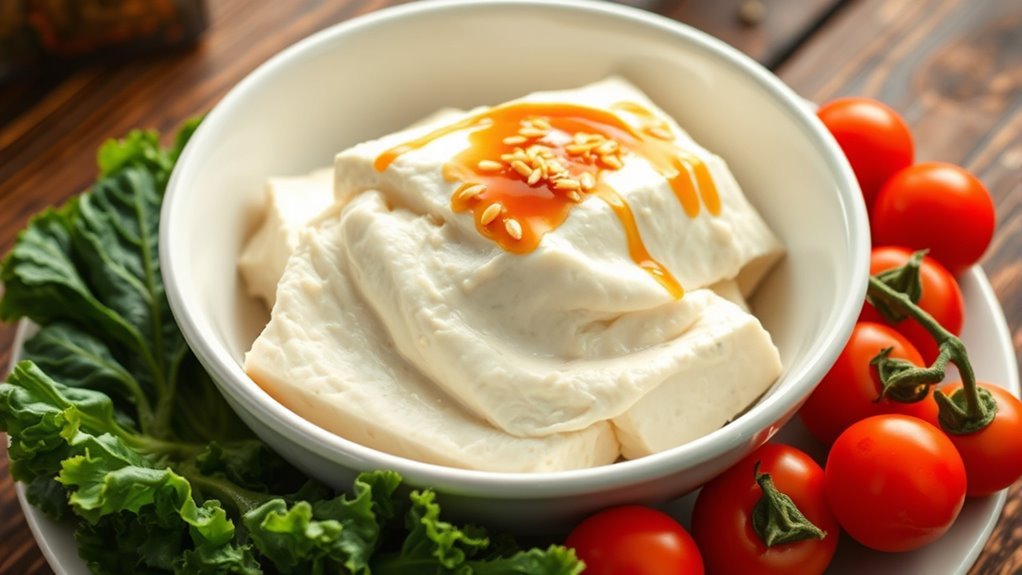Yes, tofu is keto-friendly! It’s low in carbs, with about 1.9 grams per 100 grams of firm tofu, and high in protein, making it perfect for a ketogenic diet. You can enjoy it in various meals like stir-fries or salads. However, consider potential allergies or digestive issues that some may experience. Balancing tofu with other low-carb foods can enhance your diet. Stick around to discover more about incorporating tofu into your keto meal plan and its alternatives.
Understanding Tofu: What Is It?

Tofu, often referred to as “bean curd,” is a versatile food made from soybeans. Its origins trace back over two thousand years to ancient China, where it was created as a means to preserve soybeans’ nutritional value. Today, you can find various tofu varieties, including silken, firm, and extra-firm, each with distinct textures and culinary uses. Silken tofu is often used in soups and desserts, while firm and extra-firm options work well in stir-fries and grilling. This adaptability makes tofu a favorite among various diets, including vegetarian and vegan lifestyles. By understanding the origins and varieties of tofu, you can appreciate its role in diverse culinary traditions and explore how it fits into your meal plans.
Nutritional Profile of Tofu

Rich in protein and essential nutrients, tofu offers a compelling nutritional profile that appeals to many health-conscious individuals. It’s an excellent source of high-quality protein, providing all nine essential amino acids. In addition to protein, tofu is rich in iron, calcium, and magnesium, making it a versatile choice in various tofu recipes. Its low-calorie content and high nutrient density contribute to numerous tofu benefits, including supporting muscle health and bone density. Furthermore, tofu is a great option for those looking for plant-based alternatives without sacrificing nutrition. Whether you’re adding it to stir-fries or salads, incorporating tofu into your meals can help you achieve a well-rounded diet while enjoying delicious, satisfying dishes.
Carbohydrate Content in Tofu

When considering tofu as part of your diet, it’s important to look at its carbohydrate content, especially for those following a ketogenic lifestyle. Tofu is relatively low in carbohydrates compared to many other carbohydrate sources. Generally, a 100-gram serving of firm tofu contains about 1.9 grams of carbs, making it a suitable option for keto dieters. However, it’s essential to recognize that different tofu varieties, such as silken or soft tofu, may have slightly varying carbohydrate counts. Incorporating tofu into your meals can provide a protein-rich, low-carb alternative that fits well within your dietary goals. Just be mindful of the overall carb intake from other sources to maintain ketosis effectively. Additionally, monitoring portions is essential for maintaining ketosis while enjoying various protein sources.
Types of Tofu and Their Differences
When it comes to tofu, understanding the different types can help you make better choices for your diet. Firm and soft tofu have distinct textures and uses in cooking, while silken tofu offers even more variety, particularly in smoothies and desserts. Each type also varies in its nutritional profile, which is important to take into account, especially on a keto diet.
Firm vs. Soft Tofu
While both firm and soft tofu are versatile ingredients in a keto diet, they offer distinct textures and culinary applications that can influence your meal prep. Firm tofu has a dense, sturdy structure, making it ideal for stir-fries, grilling, or baking. Its firm texture holds up well to marinades and retains its shape during cooking, providing satisfying bites.
On the other hand, soft tofu features a delicate, creamy consistency, perfect for blending into smoothies, sauces, or soups. It can also be crumbled to create a ricotta-like filling for dishes. Understanding these differences helps you choose the right tofu type for your recipes, ensuring you enjoy the benefits of both textures while maintaining your keto lifestyle.
Silken Tofu Varieties
Soft tofu isn’t the only variety worth exploring; silken tofu also offers unique qualities that can enhance your keto cooking. This type of tofu is known for its creamy texture and high moisture content, making it ideal for recipes requiring a smooth consistency. Silken tofu can easily blend into sauces, soups, and smoothies, adding protein without overwhelming flavors.
When it comes to silken tofu recipes, you can use it in savory dishes or, surprisingly, in silken tofu desserts like mousses and puddings. These recipes allow you to enjoy a sweet treat while keeping your carb count low. By incorporating silken tofu into your meals, you can enjoy the flexibility of plant-based options that align with your keto lifestyle.
Nutritional Profiles Comparison
Understanding the nutritional profiles of different types of tofu can help you make informed choices for your keto diet. There are various tofu varieties, each offering unique nutritional benefits. Firm tofu, for instance, is higher in protein and lower in carbs, making it a great option for maintaining ketosis. Soft tofu, while lower in protein, contains healthy fats and can be used in smoothies or soups. Silken tofu is versatile for desserts but also has a higher carb count. When comparing these options, consider your dietary goals. Incorporating a mix of tofu varieties can provide you with essential nutrients while keeping your carb intake in check. Explore these options to enjoy tofu’s benefits without compromising your keto lifestyle.
Benefits of Tofu on a Keto Diet
Tofu can be a valuable addition to a keto diet, especially since it’s low in carbohydrates and high in protein. It offers several tofu benefits that align well with keto compatibility, making it an excellent choice for those seeking variety in their meals. With its versatility, you can incorporate tofu into stir-fries, salads, or smoothies without compromising your carb limits. Additionally, tofu is a high-quality protein source that provides essential amino acids for muscle maintenance and repair.
Here’s a quick comparison of tofu’s nutritional profile:
| Nutrient | Per 100g | Daily Value (%) |
|---|---|---|
| Calories | 76 | 4 |
| Protein | 8g | 16 |
| Carbohydrates | 1.9g | 1 |
Potential Drawbacks of Including Tofu
While tofu is often praised for its health benefits, there are some potential drawbacks to take into account when including it in your keto diet. For starters, tofu allergies can affect some individuals, leading to reactions that may range from mild to severe. If you’re sensitive, it’s important to listen to your body and consider alternatives. Additionally, tofu can cause digestive issues for some people, particularly those who are not accustomed to soy products. Symptoms like bloating or gas might arise, which can sidetrack your keto journey. It’s vital to weigh these factors against the benefits and decide if tofu aligns with your dietary needs. Ultimately, your comfort and health should guide your choices in any diet.
How to Incorporate Tofu Into Keto Meals
If you’re looking to spice up your keto meals, incorporating tofu can be an excellent way to add protein and healthy fats. Tofu is versatile; you can sauté, grill, or bake it to suit your taste. Try marinating it in soy sauce or your favorite keto-friendly spices for added flavor. You can whip up easy tofu recipes like stir-fries with low-carb veggies or tofu scrambles for breakfast. For quick keto snacks, consider air-frying tofu cubes for a crunchy treat or blending silken tofu into smoothies for a creamy texture. By experimenting with different cooking methods and seasonings, you’ll discover how tofu can elevate your keto dining experience while keeping your macros in check.
Alternatives to Tofu for Keto Dieters
If you’re looking for alternatives to tofu on a keto diet, there are plenty of options to evaluate. Meat and seafood can provide high-quality protein with minimal carbs, while various plant-based alternatives like tempeh and seitan also fit the bill. Exploring these choices can help you maintain your dietary goals without feeling restricted. Additionally, incorporating low-carb nuts can further enhance your meal variety and support your keto journey.
Meat and Seafood Options
For those following a keto diet, there are numerous meat and seafood options that can easily replace tofu as a protein source. These alternatives not only fit within the low-carb guidelines but also provide essential nutrients. Here’s a quick comparison of some popular meat and seafood alternatives:
| Meat Options | Seafood Alternatives |
|---|---|
| Chicken thighs | Salmon |
| Beef (ground or steak) | Shrimp |
| Pork chops | Sardines |
| Lamb | Mackerel |
| Turkey | Tuna |
Incorporating these meat options and seafood alternatives into your meals can help you maintain a balanced diet while enjoying the freedom to explore diverse flavors. Plus, they’re rich in healthy fats and protein, making them perfect for keto dieters. Additionally, shrimp’s low carbohydrate content makes it an excellent choice for those seeking to adhere to a ketogenic lifestyle.
Plant-Based Alternatives Available
What are some viable plant-based alternatives to tofu for those on a keto diet? If you’re looking to diversify your meals, consider tempeh, which is fermented and packed with plant protein, making it a great option for keto recipes. Seitan, made from wheat gluten, offers a meaty texture and low carb count. Another option is jackfruit, which can mimic the texture of pulled meat in savory dishes. Edamame is another excellent source of protein and can be tossed into salads or stir-fries. Additionally, nuts and seeds, like almonds or chia seeds, provide healthy fats and protein. These alternatives can easily be incorporated into your tofu recipes, helping you maintain a balanced and varied keto diet while enjoying plant-based options. Including options like edamame, which has lower net carbs compared to most legumes, can enhance your meal planning while adhering to keto guidelines.
Personalizing Your Keto Diet: Making the Right Choices
While managing the keto diet, it’s essential to make choices that align with your personal health goals and lifestyle. Start by considering your personal dietary preferences; whether you’re vegetarian, vegan, or omnivorous, keto meal planning can accommodate diverse needs. Focus on high-quality fats, moderate protein, and low-carb veggies that you enjoy. Incorporate foods like avocados, nuts, and tofu, which can fit seamlessly into your meals while ensuring you stay in ketosis. Don’t forget to listen to your body—everyone’s keto journey is unique, and flexibility is key. As you experiment with different foods, you’ll discover what fuels you best. Ultimately, personalizing your keto diet empowers you to enjoy the freedom of food while achieving your health goals. Additionally, be mindful of the carbohydrate content in fruits like apricots, which can impact your progress if consumed excessively.
Frequently Asked Questions
Can Tofu Cause Digestive Issues on a Keto Diet?
Tofu can cause digestive issues on a keto diet for some people. While it’s low in carbs, its high fiber content might lead to bloating or gas, especially if your body isn’t used to it. You might notice keto symptoms like discomfort after consuming it. It’s essential to listen to your body and monitor how tofu affects your digestion. If you experience issues, consider adjusting your intake or choosing alternatives that suit you better.
Is Organic Tofu Better for Keto Than Regular Tofu?
Organic tofu can offer some nutritional benefits over regular tofu, but both can fit into a keto diet. Organic varieties typically contain fewer pesticides and may have higher nutrient levels, which can be beneficial for your overall health. However, the difference in nutritional content is often minimal, so it’s essential to focus on your overall dietary balance. Ultimately, choosing between organic and regular tofu depends on your personal preferences and health goals.
How Does Tofu Compare to Meat for Protein on Keto?
Tofu’s like a versatile chameleon in the world of protein sources. When comparing tofu to meat on a keto diet, tofu offers a great plant-based option with fewer calories and carbs, making it a popular choice for those seeking meat alternatives. While meat typically has a higher protein density, tofu’s benefits include essential amino acids and isoflavones, contributing to heart health. Balancing both can provide you with diverse nutritional freedom.
Can I Eat Tofu if I’m Allergic to Soy?
If you’re allergic to soy, you should avoid tofu, as it can trigger allergy symptoms like hives or digestive issues. Instead, consider soy alternatives like tempeh, seitan, or legumes, which offer protein without the risk of soy-related reactions. Always consult with a healthcare professional before making dietary changes, especially if you have food allergies. Exploring different protein sources can help you maintain a balanced diet while respecting your dietary restrictions.
Does Tofu Affect Ketosis or Blood Sugar Levels?
Tofu’s low carbohydrate content—just about 1.9 grams per 100 grams—means it typically won’t knock you out of ketosis. In fact, its protein and healthy fats can support your energy needs while maintaining ketosis impact. Plus, tofu nutrition is rich in calcium and iron, which are beneficial for overall health. Just keep an eye on portion sizes, as too much can still affect your blood sugar levels, especially if you’re sensitive.
References
- https://www.healthline.com/nutrition/tofu-and-keto
- https://www.ncbi.nlm.nih.gov/pmc/articles/PMC6838229/
- https://www.medicalnewstoday.com/articles/324854
- https://www.webmd.com/diet/obesity/what-is-tofu
- https://www.mayoclinic.org/healthy-lifestyle/nutrition-and-healthy-eating/expert-answers/tofu/faq-20057986
- https://www.cdc.gov/nutrition/resources-publications/index.html
- https://www.ketodietapp.com/Blog/post/Is-Tofu-Keto-Friendly
- https://www.nutrition.gov/topics/nutrition-basics/vegetarian-nutrition
- https://www.bbcgoodfood.com/howto/guide/what-is-tofu


